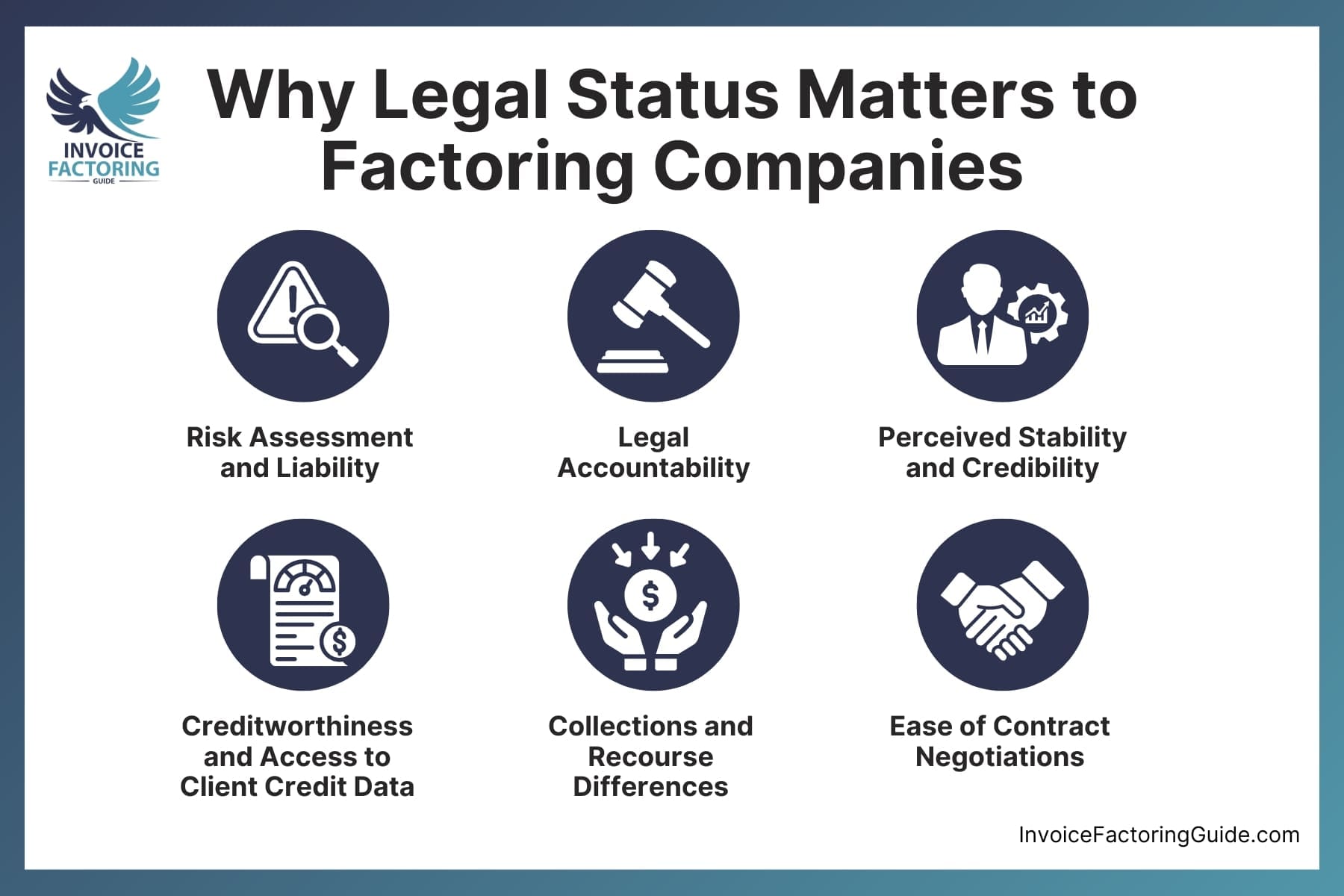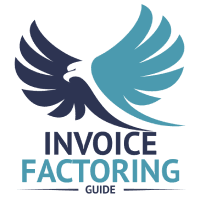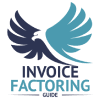
When it comes to financing, most business owners think revenue is king. But most don’t realize that your business’s legal status has a major impact on funding, too. On this page, we’ll walk you through how your business’s legal status and factoring are intertwined, how approval and terms are impacted, and what to do if your legal structure is becoming a barrier to the funding your business needs.
What Does “Legal Status” Mean?
When we talk about a business’s legal status, we’re really talking about its legal structure or how it’s organized in the eyes of the law. This affects everything from how the business is taxed to who’s held accountable in case of financial issues.
The Common Types of Business Legal Status
There are several primary structures you might choose when you’re starting or registering your business, each with unique implications.
Sole Proprietorship
This is the simplest structure, where one person owns and operates the business. It’s also the most popular structure for non-employer firms, according to the U.S. Small Business Administration (SBA). However, popularity drops off as businesses add employees, likely because operating a sole proprietorship comes with some serious drawbacks. Legally, the company and owner are considered one entity, which means personal assets can be at risk if there’s a problem with the business.
Partnerships
Partnerships are owned by two or more individuals. The partnership could be general (all partners are involved in running the business) or limited (some partners are only investors with limited liability). This structure spreads out risk but also introduces complexities in ownership.
Limited Liability Company (LLC)
LLCs combine aspects of both corporations and partnerships, offering liability protection like a corporation but with a less formal structure.
Corporations (C Corp & S Corp)
Corporations are the most complex, legally separate from their owners, and can raise funds by issuing stock. C Corps are taxed separately from their owners, while S Corps pass income through to shareholders’ personal taxes to avoid double taxation.
What is Factoring?
Invoice factoring is an alternative to traditional business funding methods. Rather than taking out a loan, which your business pays back with interest, it sells its unpaid invoices to a factoring company, or factor, at a discount. The factor pays the business most of the value of the invoice immediately, thus eliminating the typical wait of 30 or more days for client payment.
The client owing the balance pays the factor based on the invoicing terms established with the business. When the payment arrives, the factor sends the remaining sum to the business minus a small fee for the service.
Common Types of Factoring
There are several types of factoring, allowing businesses to tailor their agreement to their needs.
Recourse Factoring
With recourse factoring, your business sells invoices to a factoring company with the understanding that if a client doesn’t pay, your business is responsible for covering the unpaid balance. This is the most common type of factoring and generally comes with the lowest fees because the factor faces less risk.
Non-Recourse Factoring
With non-recourse factoring, the factor assumes the risk of non-payment if a client defaults due to insolvency or bankruptcy. This means your business won’t be held liable for unpaid invoices under these conditions. Since the factor is taking on more risk, this type typically comes with higher fees.
Spot Factoring
Spot factoring allows you to factor a single invoice rather than committing to a contract with multiple invoices. It’s great if you only need quick cash infusions here and there without tying your business to a long-term arrangement. This also means spot factoring offers flexibility. However, it tends to have higher fees since factors can’t rely on ongoing business with you.
Key Benefits of Factoring
Businesses benefit from factoring in a variety of ways. Below, we’ll take a look at some key advantages of factoring.
Improved Cash Flow
Factoring turns your unpaid invoices into immediate working capital, giving you access to cash typically within 24 to 48 hours. This can be crucial if you’re waiting on clients who may take 30, 60, or even 90 days to pay.
Debt-Free Financing
Factoring isn’t a loan, so it won’t add debt to your balance sheet. This is particularly helpful if you want to preserve your business’s credit or plan to apply for other financing down the line.
Flexible and Scalable
Factoring can grow with your business. As your sales and accounts receivable increase, so does your ability to factor larger amounts, unlike traditional loans with set limits that can restrict growth.
Credit Risk Transfer
With non-recourse factoring, some credit risk transfers to the factoring company, meaning they absorb the loss if a client defaults due to insolvency. This gives your business a layer of protection against client credit issues.
Outsource Collections and Accounts Receivable Management
Many factoring companies also handle collections, meaning they’ll follow up on invoices and manage payment processing, freeing your team to focus on core business operations.
This added service is particularly beneficial for small businesses or startups that might not have a dedicated collections department. It can reduce stress and free up time for your team.
Strengthen Business Relationships
When your cash flow is stable, you’re less likely to delay supplier payments or miss payroll deadlines, which helps you build a reputation as a reliable business partner. Maintaining on-time payments and a healthy cash flow can improve your credit rating and strengthen relationships with vendors and employees.
Why Legal Status Matters to Factoring Companies
Legal status plays a significant role in factoring because it affects how a factoring company evaluates risk, assesses responsibility, and processes factoring agreements. Let’s examine the mechanisms behind this.

Risk Assessment and Liability
Factoring companies want to know how a business is structured to understand who bears responsibility if something goes wrong. With certain legal structures, like a sole proprietorship, there’s no separation between the company and the owner, which can increase the risk for factors.
- Sole Proprietorships: Since the business owner is personally liable, factors may be cautious, as the owner’s personal assets might be at risk if a client doesn’t pay or if other financial issues arise. Factoring companies often prefer structures with limited liability to reduce this type of risk.
- LLCs and Corporations: These structures offer liability protection, meaning the business and owner are legally separate. This setup can make factors more comfortable with providing funding since the company itself is liable, not the individual owners.
Legal Accountability
A factor needs a clear line of accountability to ensure smooth transactions and collections. Legal status defines who is accountable for decisions and who can sign on behalf of the business.
For example, in a corporation, only designated officers or directors can sign contracts. A factor will need clarity on who has legal authority to make financial agreements. This is much more straightforward with corporations than a general partnership, where multiple partners might share that authority.
Perceived Stability and Credibility
Specific business structures may appear more stable or well-established, a positive signal for factoring companies. For example, LLCs and corporations generally require more formal registration and compliance steps, indicating a level of organization and commitment that factors tend to favor.
Creditworthiness and Access to Client Credit Data
Corporations and LLCs typically have credit profiles that can be easier for factoring companies to assess compared to sole proprietorships. With these structures, it’s more common for factoring companies to access a credit report, which can play a part in setting favorable rates and terms.
Let’s say an LLC is applying for factoring and has a history of paying vendors on time. This boosts credibility and can lead to better rates. In contrast, sole proprietorships may not always have extensive credit records, making it trickier for factors to assess risk.
Collections and Recourse Differences
If collections become necessary, factoring companies may find it easier to recover funds from entities with a distinct legal personality (like corporations and LLCs) than from sole proprietors or partnerships, where personal and business assets may be intertwined.
In cases where recourse applies, factors often prefer LLCs or corporations because they can pursue the business itself rather than individuals. With sole proprietorships, there’s a risk that personal finances may be impacted, which can complicate collections and repayment.
Ease of Contract Negotiations
Factoring companies generally have specific requirements around who can enter contracts and manage agreements on behalf of the business. With LLCs and corporations, the roles and authority levels are usually more defined, allowing for smoother contract negotiations.
For example, a corporation has clear documentation on who holds authority (like a CFO or CEO), which reduces the factor’s legal and operational risk. Factors might see a sole proprietorship or partnership as more complex due to the less formalized hierarchy.
How Your Legal Status Impacts Approval and Terms
Now that we’ve covered the background, let’s lay out exactly how your legal status can impact your approval chances and the terms you’re likely to be offered. This way, you’ll have a clear picture of what factoring companies look for and how different structures might affect your options.
Sole Proprietorships: Limited Options and Higher Rates
As a sole proprietor, you and your business are legally the same entity, meaning there’s no separation of liability. Because of this, factoring companies often see sole proprietorships as higher-risk clients. Many factors either don’t work with sole proprietors at all or, if they do, they may require additional safeguards, like higher fees or personal guarantees.
Partnerships: Case-by-Case Approval, Potentially Complicated Terms
Partnerships come with multiple owners who may share liability, so factors look carefully at the structure and partner agreements. General partnerships, where all partners share liability, might face tougher requirements compared to limited partnerships, where liability is more defined.
LLCs: Generally Favorable for Approval and Competitive Terms
LLCs offer limited liability protection, making them more attractive to factoring companies. With an LLC, your personal assets are separated from the business, which reduces the factor’s risk. LLCs typically have clear documentation about roles and responsibilities, making them easier to work with from a legal perspective.
Corporations: Highest Approval Chances, Best Terms
Corporations, whether C Corps or S Corps, are viewed as the most stable and reliable structures by factoring companies. Corporations are legally separate from their owners, meaning liability falls on the business itself. This separation, combined with formalized roles and established credit history, makes corporations highly appealing for factors.
What to Do if Your Legal Structure Makes it Difficult to Factor

If your legal status is making it difficult to qualify for factoring or to secure favorable terms, there are several steps you can take to improve your position.
Consider Changing Your Legal Structure
One of the most effective solutions is to shift to a business structure that’s more favorable to factoring, like an LLC or corporation. This change can help limit your personal liability, making your business a more attractive prospect for factoring companies.
Consult a business attorney or accountant to understand the process and benefits of transitioning to an LLC or corporation. This often requires filing paperwork with your state, adjusting your tax filings, and setting up formal business roles, but it can be a worthwhile investment for access to factoring and other financial benefits.
Many states also offer self-service portals to help people through the process, which may be a viable option for some businesses, too.
Work with Specialized Factoring Companies
While some factors shy away from sole proprietorships or partnerships, others specialize in working with these structures. These companies understand the unique needs of smaller or more flexible business types and might offer terms tailored for sole proprietors or partnerships.
Look for factoring companies that emphasize small business or freelance factoring services. Be sure to compare rates, recourse options, and fees, as some specialized factors may still charge a premium to cover the higher risk associated with sole proprietorships and partnerships.
Negotiate with Personal Guarantees or Collateral
If changing your structure isn’t feasible, you can sometimes make up for it by offering a personal guarantee or providing collateral. Factoring companies may be more open to working with you if they know they have additional security.
Note that a personal guarantee makes you personally responsible for paying back any uncollected invoices, while collateral like equipment or property provides the factor with assets to recover losses if your clients don’t pay. While this isn’t ideal, it’s often a good short-term solution while you work toward a better structure.
Build Stronger Credit and Client Reliability
Factors place a high priority on client creditworthiness and payment reliability, so if you’re a sole proprietor or in a general partnership, make sure you have a solid track record with clients. The more reliable your client base is, the more comfortable factoring companies will be, even if your structure isn’t ideal.
To make this happen, focus on working with clients who have established credit or payment histories and encourage clients to pay on time by offering early payment incentives. Some factoring companies may be willing to work with higher-risk structures if they’re confident in the stability of your client base.
Build Up Your Invoices for Better Leverage
In some cases, having larger or recurring invoices can make factors more flexible. If you know you have big accounts receivable coming in or regular invoices with well-known clients, use this as leverage when talking to factoring companies.
Discuss any long-term contracts or high-value clients you work with, as factors might make exceptions if your invoice volume or value is compelling. Bigger invoices reduce the factor’s risk and can sometimes lead to better terms, even for sole proprietors or partnerships.
Talk to a Factoring Specialist About Approval
Whether you’re unsure if you qualify and have questions or are ready to get started with invoice factoring, the next step is to talk to a factoring specialist about your business and its funding needs. Share a few details about your business, and we’ll match you with an experienced factoring company that can help.
Business Legal Status and Factoring FAQs
Can sole proprietors qualify for invoice factoring?
Yes, but options may be limited. Factoring companies often view sole proprietorships as higher risk due to the lack of liability separation, meaning you’re personally responsible for debts. While some factors may still work with sole proprietors, terms can include higher fees or personal guarantees. Switching to an LLC or corporation may improve your approval chances and terms.
What are the best business structures for factoring?
LLCs and corporations (C Corps or S Corps) are the most favorable for factoring. These structures limit personal liability, giving factoring companies added security and encouraging more favorable terms. LLCs and corporations also have defined roles and ownership structures, which simplifies contracts and lowers risk. Factors generally prefer these structures over sole proprietorships or general partnerships.
What legal structures do factoring companies prefer?
Factoring companies prefer LLCs and corporations due to their liability protections and organizational clarity. These structures separate business and personal liabilities, reducing the risk for factors. Sole proprietorships or general partnerships, where liabilities are shared personally, are less desirable because they introduce additional risks for the factoring company.
Why do factoring companies care about my business’s legal status?
Legal status affects the level of risk and accountability in a factoring arrangement. Factors look for structures like LLCs and corporations, which protect them by separating personal and business liabilities. Sole proprietorships or partnerships, where liability isn’t separate, may present higher risk, making factoring companies hesitant to work with them or likely to charge higher fees.
Do I need to be an LLC or corporation to use factoring?
Not necessarily, but it helps. LLCs and corporations generally receive the best factoring terms due to liability protection and formal structure. Sole proprietors and partnerships may still qualify but could face higher fees, stricter terms, or need a personal guarantee. Changing your structure to an LLC or corporation can improve your chances of approval and reduce costs.
What should I do if my business structure impacts my ability to factor?
Consider changing your structure to an LLC or corporation to reduce risk for factors. Alternatively, look for specialized factoring companies that work with sole proprietors, or offer a personal guarantee to offset risk. Improving client payment reliability and negotiating with factors can also improve terms without requiring a change in structure.
Is it possible to get factoring as a partnership?
Yes, partnerships can qualify for factoring, but general partnerships may face challenges due to shared liability. Limited partnerships, where liability is more defined, are more favorable for factoring companies. Partnerships may need to provide personal guarantees or show clear partner roles to receive more favorable terms.
What are the benefits of changing my legal structure for factoring?
Changing to an LLC or corporation can significantly improve factoring eligibility and terms. LLCs and corporations separate personal liability, which lowers the factor’s risk, making them more likely to approve and offer better rates. It can also enhance your business’s credibility and stability, attracting more favorable financing options in the long run.
Can I use personal guarantees to qualify for factoring as a sole proprietor?
Yes, offering a personal guarantee is an option for sole proprietors who may otherwise face challenges qualifying for factoring. A personal guarantee assures the factoring company you’ll cover unpaid invoices, which can offset some risk. While not ideal, it’s a viable option if changing your structure isn’t feasible in the short term.
How does my business structure affect factoring approval and terms?
Your business structure can impact factoring approval, as certain structures—like sole proprietorships—may lead to legal issues around liability. For example, sole proprietors are personally liable for debts, which may make factors wary due to the increased risk. LLCs and corporations, however, offer liability protection that reduces potential legal concerns for factoring companies. This legal separation of personal and business assets generally leads to higher approval rates and more favorable terms.

About Invoice Factoring Guide
Related Articles
Get an instant funding estimate
Results are estimates based on the calculated rate and the total invoice amount provided.
Actual rates may vary.
Request a Factoring Rate Quote
PREFER TO TALK? Call us at 1-844-887-0300










